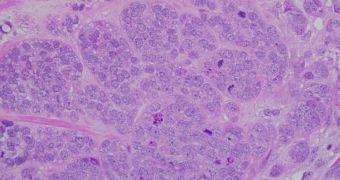For many years, experts have suspected a link between exposure to stressful experiences and the development of breast cancer, but were unable to collect proof of the connection. A new study by experts at the University of Western Ontario, in Canada, finally reveals the relationship.
Investigators uncovered that chronic stress tends to boost the production of two neurotransmitters – chemicals that facilitate the transmission of electrical impulses between synapses connecting neurons – that appear to play a role in facilitating the development of breast cancer cells.
Details of the new investigation were published in the latest online issue of the esteemed International Journal of Cancer. The work was led by UWO Departments of Medical Biophysics and Biomedical Engineering expert Dwayne Jackson, who teamed up with PhD candidate Philip Medeiros.
The two neurotransmitters are apparently involved in both stimulating the growth of cancer cells, and in their migration through the breast. When cancer cells begin to move from the original tumor, the risks of metastasis or the generalized spread of cancer to all organs increases dramatically.
UWO experts say that their new work was focused on understanding how a branch of the human nervous system – the sympathetic nervous system – interacts with cells located throughout all the organs in the body. Stress has the tendency to activate this system.
When this happens, cellular receptors are commanded to release the neurotransmitters norepinephrine and neuropeptide Y (NPY). Together, these chemicals prepare the body for the instinctual fight-or-flight response that characterizes stressful situations.
“We have all heard anecdotally that stress causes cancer. Our lab is particularly interested in how chronic stress may cause increases in the release of NPY and whether that may contribute to the progression of breast cancer,” Jackson says.
“It has been shown that women with a familial history of breast cancer exhibit greater physiological stress responses to normal everyday stressors,” adds the expert, who holds an appointment as an assistant professor at the UWO Schulich School of Medicine & Dentistry.
“Since there is a very dense supply of sympathetic nerves in the female breast, it would be reasonable to suspect that NPY may be released in greater amounts in the breasts of those at risk for breast cancer,” he goes on to say.
The Natural Sciences and Engineering Research Council of Canada, the Canadian Institutes of Health Research, and the Canadian Breast Cancer Research Alliance provided the funds needed for the work.

 14 DAY TRIAL //
14 DAY TRIAL //